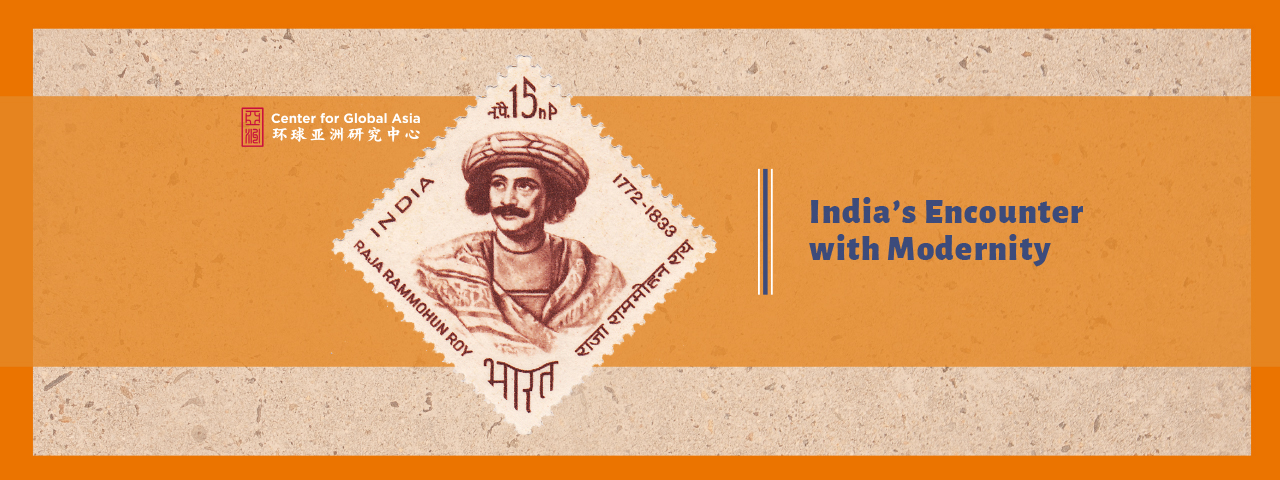CONTACT US
Email: shanghai.cga@nyu.edu
Phone Number: +86 (21) 20595043
WeChat: NYUShanghaiCGA
Address:
Room W822, 567 West Yangsi Road,
Pudong New Area, Shanghai, China

© 2024 All Rights Reserved

Venue: Room 102, 1555 Century Avenue, NYU Shanghai
Date: Monday, April 22, 2019
Time: 17:30 - 19:00 CST
Notions of modernity and modernization came to India as British rule established itself. These ideas were received enthusiastically by the urban elite. This reception is seen through the careers of three remarkable individuals of the 19th century—Rammohun Roy, Iswarchandra Vidyasagar and R.C.Dutt. Roy was a social reformer who amongst other things advocated successfully in 1829 the law prohibiting sati (the burning of widows on the funeral pyres of their dead husbands). Vidyasagar was a traditional Brahmin pundit who worked selflessly in the field of education and social reform. He successfully moved the Hindu Widow Remarriage Bill in 1855. Dutt was a member of the Indian Civil Service who wrote two volumes on the economic history of India under British rule. On the basis of the careers of these remarkable individuals this presentation goes on to argue that these responses were partial and inadequate in their acceptance of modern ideas and received their counterpoint in the rejection of the modern in the writings and work of Gandhi.
Rudrangshu Mukherjee is Professor of History and the Chancellor of Ashoka University. He was the founding Vice Chancellor of Ashoka University. He taught history at the University of Calcutta and held visiting appointments at Princeton University, the University of Manchester and the University of California, Santa Cruz. He was the Editor of the Editorial Pages, at The Telegraph. He studied at Calcutta Boys’ School, Presidency College, Kolkata, Jawaharlal Nehru University, New Delhi, and St. Edmund Hall, Oxford. He was awarded a D.Phil in Modern History by the University of Oxford in 1981.
He is internationally acclaimed as a historian of the revolt of 1857 in India. His first book Awadh in Revolt, 1857-58: A Study of Popular Resistance has become a standard reference on the subject. He has looked at the 1857 rebellion in four other books: Spectre of Violence: The 1857 Kanpur Massacres, Mangal Pandey: Brave Martyr or Accidental Hero?, Dateline 1857: Revolt against the Raj and The Year of Blood: Essays on the Revolt of 1857. He is the editor of The Penguin Gandhi Reader and Great Speeches of Modern India. His most recent books are Nehru & Bose: Parallel Lives, Twilight Falls on Liberalism and Oxford India Short Introduction: Jawaharlal Nehru.
Introduction and moderation of the Q&A by Vidhya Raveendranathan, Center for Global Asia Doctoral Fellow, NYU Shanghai.
To our visitors:
• RSVP may be required for this event. Please check event details
• Visitors will need to present a photo ID at the entrance
• There is no public parking on campus
• Entrance only through the South Lobby (1555 Century Avenue)
• Taxi card
• Metro: Century Avenue Station, Metro Lines 2/4/6/9 Exit 6 in location B
• Bus: Century Avenue at Pudian Road, Bus Lines 169/987
Email: shanghai.cga@nyu.edu
Phone Number: +86 (21) 20595043
WeChat: NYUShanghaiCGA
Address:
Room W822, 567 West Yangsi Road,
Pudong New Area, Shanghai, China

© 2024 All Rights Reserved